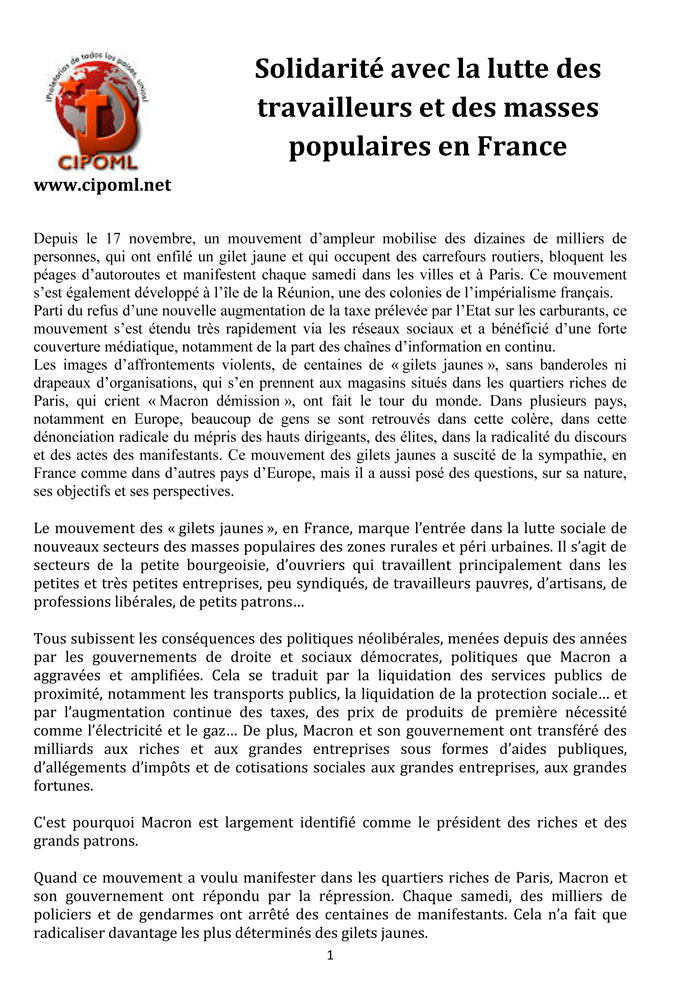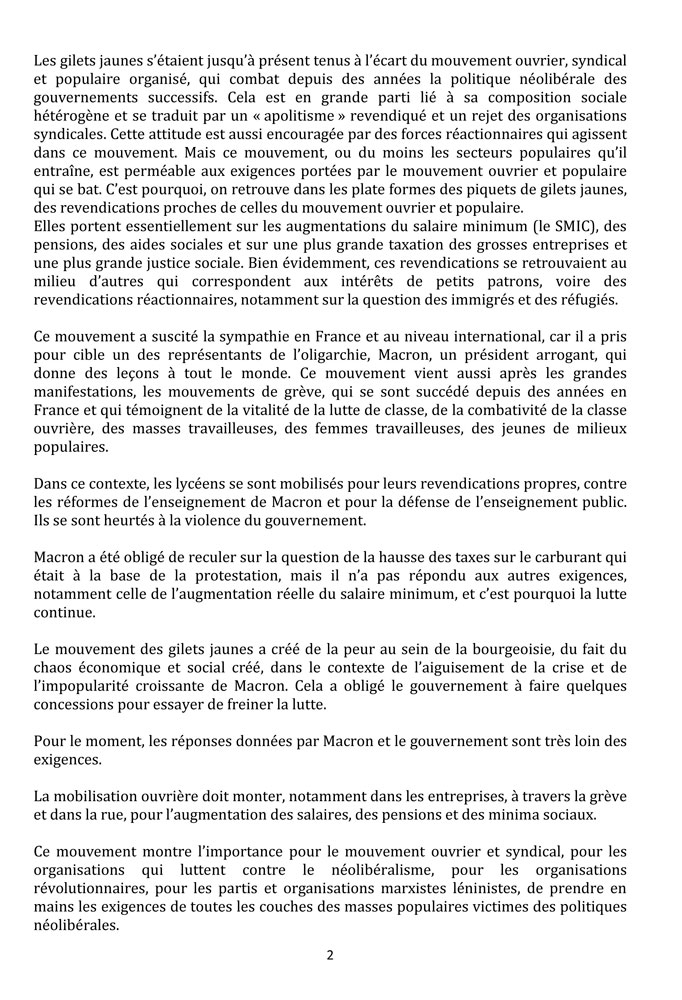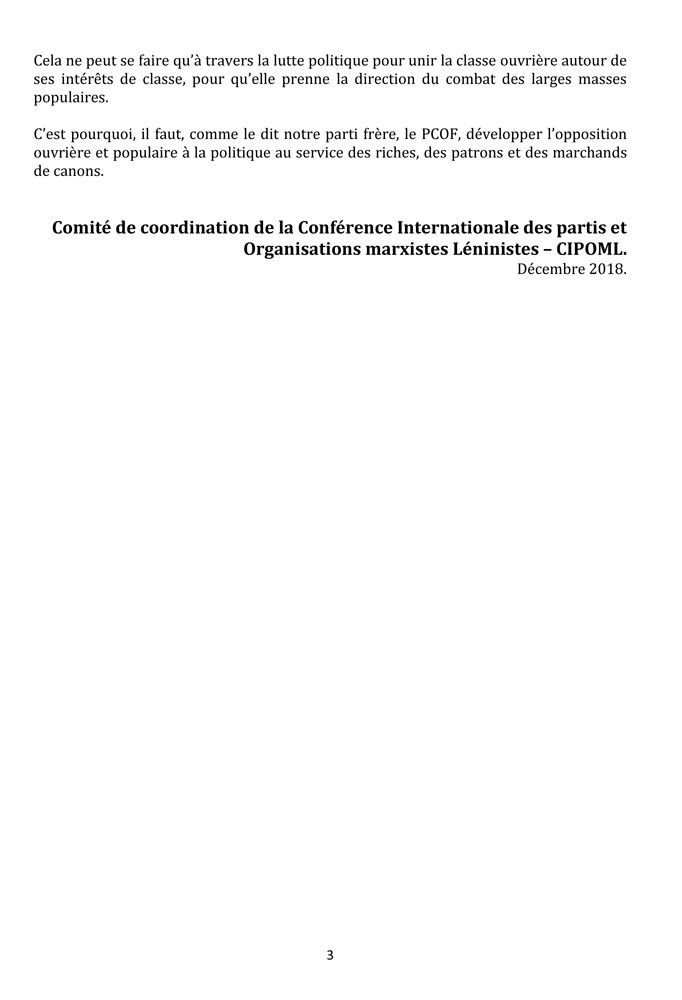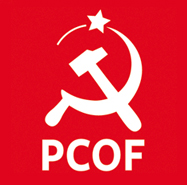Déclaration du Comité de Coordination de la Conférence Internationale des Partis et Organisations marxistes léninistes : Solidarité avec la lutte des travailleurs et des masses populaires en France (décembre 2018)

Le 18 décembre, des manifestations de solidarité avec les migrants à Paris et dans plusieurs villes
22 décembre 2018Non à la remise en cause du droit de manifester
10 janvier 2019
Texte à télécharger (voir en bas de page).
Texte en espagnol et en anglais en bas de page.


Solidaridad con la lucha de los trabajadores y masas populares de Francia
Desde el 17 de noviembre se desarrolla un amplio movimiento de decenas de miles de personas, vestidas con un chaleco amarillo, que ocupan los cruces de carreteras, bloquean los accesos de las autopistas y se manifiestan cada sábado en París y otras ciudades. Ese movimiento se desarrolla también en la Isla Reunión, una de las colonias del imperialismo francés.
Provocado por el rechazo de un nuevo aumento de la tasa impuesta por el Estado sobre los carburantes, el movimiento se ha difundido rápidamente por las redes sociales con una fuerte cobertura mediática concretamente en las cadenas de información continua.
Las imágenes de violentos enfrentamientos de centenares de «chalecos amarillos», sin banderas ni pancartas de organizaciones (excepto la bandera de Francia) atacando almacenes de los barrios ricos de París y gritando «¡Macron dimisión!», se han visto en todo el mundo. En varios países, concretamente de Europa, mucha gente se ha visto reflejada en este estallido de cólera, en la denuncia radical, en los discursos y actos de los manifestantes. El movimiento de los «chalecos amarillos» se ha ganado la simpatía tanto en Francia como en otros países europeos y también ha planteado preguntas sobre su naturaleza, objetivos y perspectivas.
El movimiento de los chalecos amarillos en Francia, significa la entrada en la lucha social de nuevos sectores de las masas populares, provenientes de las zonas rurales y de la periferia de las ciudades. Se trata de sectores de la pequeña burguesía, de obreros principalmente de pequeñas empresas, poco sindicalizados, de obreros pobres, de artesanos, profesionales, pequeños patrones…
Todos son víctimas de las consecuencias de las políticas neoliberales desarrolladas desde hace años por gobiernos de derecha y socialdemócratas, políticas que Macron ha agravado y ampliado. Se manifiestan en liquidaciones de servicios públicos de las cercanías, espacialmente el transporte público, la liquidación de la protección social… y en el aumento continuo de los impuestos, de los precios de productos de primera necesidad, como la electricidad, el gas… Además, Macron y su gobierno han transferido billones a los ricos, a las grandes empresas en forma de ayudas públicas, y reducciones de impuestos y cotizaciones sociales a las grandes empresas, a las grandes fortunas.
Por eso, Macron es ampliamente definido como el presidente de los ricos y de la gran patronal.
Cuando ese movimiento trataba manifestar en los barrios ricos de Paris, Macron y su gobierno han respondido con la represión. Cada sábado, miles de policías y gendarmes han arrestado centenares de manifestantes. Eso ha radicalizado los sectores más consecuentes de los chalecos amarillos.
Hasta ahora, los chalecos amarillos se han mantenido al margen del movimiento obrero, sindical y popular organizado que lucha desde años contra la política neoliberal de los gobiernos de turno. Esto se debe en gran parte a su composición social heterogénea y se expresa en un « apoliticismo » reivindicado y un rechazo a las organizaciones sindicales. Esa actitud es también alentada por fuerzas reaccionarias que actúan dentro el movimiento. Pero entre los chalecos amarillos, al menos en los sectores obreros y populares que están involucrados, son permeable a las exigencias del movimiento obrero y popular que lucha. Por eso, hay demandas en las plataformas de los piquetes de chalecos amarillos que son cercanas de las demandas del movimiento obrero y popular. Ellas son esencialmente reivindicaciones: de alzas del salario mínimo (SMIC), de las pensiones y ayudas sociales y de mayores impuestos a las grandes empresas y otras, de justicia social. Por supuesto, hay otras exigencias que corresponden a los intereses de los pequeños patrones, y algunas de corte reaccionario, especialmente sobre la cuestión de los inmigrantes y refugiados.
Ese movimiento ha generado simpatía en Francia y al nivel internacional, porque ha atacado a uno de los representantes de la oligarquía, Macron, un presidente arrogante que da lecciones a todo el mundo. Ese movimiento viene también después de grandes manifestaciones, de huelgas que se sucedieron desde hace años en Francia y que demuestran la vitalidad de la lucha de clases, la combatividad de la clase obrera, de las masas trabajadoras, de las mujeres trabajadoras, de la juventud de los sectores populares.
En el contexto de este movimiento se produjo la movilización de los estudiantes secundarios por sus propias reivindicaciones, en contra de las reformas de la educación de Macron y en defensa de la educación pública, que fue respondido más violentamente por el gobierno.
Macron se vio obligado a retroceder en el aumento de la tasa sobre la gasolina que estaba al inicio de la protesta; pero no ha respondido a las otras demandas, especialmente a la demanda de alza real del salario mínimo. Por eso la lucha continúa.
El Movimiento de los chalecos amarillos está generando miedo en la burguesía, por el caos económico y social, en el contexto de la agudización de la crisis y la creciente impopularidad de Macron. Esto obligará al gobierno a hacer algunas concesiones con el propósito de frenar la lucha.
Por el momento, la repuesta de Macron y de sus ministros está muy lejos de las exigencias del movimiento.
La movilización obrera debe crecer, especialmente en las empresas, a través de huelgas y manifestaciones en las calles, por el aumento de los salarios, de les pensiones y de los beneficios sociales.
Ese movimiento demuestra la importancia para el movimiento obrero y sindical, para las organizaciones que luchan contra el neoliberalismo, para las organizaciones revolucionarias, para los partidos y organizaciones marxista leninistas, de empoderarse de las demandas de todas las capas populares, víctimas de las políticas neoliberales, para impulsar y enrumbar la lucha contra el capitalismo, por la revolución y el socialismo.
Por eso es necesario de impulsar la lucha política para unir la clase obrera alrededor de sus intereses de clase, para que la clase obrera tome la dirección del combate de las amplias capas populares.
Es necesario, como afirma nuestro partido hermano de Francia, el PCOF, desarrollar la oposición obrera y popular contra la política al servicio de los ricos, de los patrones de los vendedores de armas.
Comité de Coordinación de la Conferencia Internacional de Partidos y Organizaciones Marxista Leninistas, CIPOML
Diciembre de 2018
Solidarity with the struggle of the workers and popular masses of France
Since November 17 a broad movement has developed of tens of thousands of people, dressed in yellow vests, who are occupying highway junctions, blocking access roads and demonstrating every Saturday in Paris and other cities. This movement is also developing in the island of Reunion, one of the colonies of French imperialism.
Motivated by the rejection of a new increase in the tax on fuels imposed by the State, the movement has spread rapidly through social networks with strong media coverage, specifically in 24-hour news services.
The images of violent clashes of hundreds of « yellow vests, » without flags or banners of organizations (except the flag of France) attacking warehouses in the wealthy neighborhoods of Paris and shouting « Macron resign! » have been seen around the world. In several countries, particularly in Europe, many people identified themselves in this outbreak of anger, in radical denunciation, speeches and acts of the demonstrators. The movement of the « yellow vests » has gained sympathy both in France and in other European countries and has also raised questions of its nature, objectives and prospects.
The movement of the yellow vests in France means the entry into the social struggle of new sectors of the popular masses, those coming from the rural areas and from the outskirts of the cities. These are sectors of the petty bourgeoisie, of workers mainly from small companies, those with little union organization, poor workers, artisans, professionals, small employers, etc.
All are victims of the consequences of neoliberal policies developed for years by right-wing and social democratic governments, policies that Macron has aggravated and expanded. They are demonstrating against elimination of neighborhood public services, especially public transport, the elimination of social protection, etc., and against the continuous increase in taxes, in prices of basic necessities, such as electricity, gas, etc. Moreover, Macron and his government have transferred billions to the rich, to the big companies in the form of public aid, and the reduction of taxes and social contributions on big companies, on large wealth.
That is why Macron is widely considered the president of the rich and the big employers.
When that movement tried to demonstrate in the wealthy neighborhoods of Paris, Macron and his government responded with repression. Every Saturday, thousands of police and gendarmes arrested hundreds of protesters. This has radicalized the most consistent sectors of the yellow vests.
Until now, the yellow vests have remained outside the organized workers, trade union and popular movement that has been fighting for years against the neoliberal policies of the government in office. This is due in large part to its heterogeneous social composition and is expressed in a so-called « apoliticism » and rejection of trade union organizations. This attitude is also encouraged by reactionary forces within the movement. But among the yellow vests, at least in the workers and popular sectors that are involved, they are open to the demands of the workers and popular movement that is fighting. That is why there are demands on the positions of the picket lines of the yellow jackets that are close to the demands of the workers and popular movement. These are essentially the demands: increase in the minimum wage (SMIC), pensions and social assistance and higher taxes on large companies and others, for social justice. Of course, there are other demands that correspond to the interests of the small bosses, and some of a reactionary nature, especially on the issue of immigrants and refugees.
That movement has created sympathy in France and internationally, because it has attacked one of the representatives of the oligarchy, Macron, an arrogant president who gives lessons to the whole world. This movement also comes after major demonstrations, strikes that have been going on for years in France and that show the vitality of the class struggle, the militancy of the working class, of the laboring masses, of working women, of youth of the popular sectors.
In the context of this movement there took place the mobilization of secondary students for their own demands, against Macron’s education reforms and in defense of public education, to which the government responded very violently.
Macron was forced to retreat on the increase in the taxes on gasoline that was at the beginning of the protest; but he has not responded to the other demands, especially the demand for a real increase in the minimum wage. That is why the struggle continues.
The movement of the yellow vests is creating fear in the bourgeoisie, due to the economic and social chaos, in the context of the sharpening of the crisis and Macron’s growing unpopularity. This will force the government to make some concessions in order to stop the struggle.
For the moment, the response of Macron and his ministers is very far from the demands of the movement.
The mobilization of the workers must grow, especially in the companies, through strikes and demonstrations in the streets, for an increase in wages, pensions and social benefits.
This movement shows the importance for the workers and union movement, for the organizations that are fighting against neoliberalism, for the revolutionary organizations, for the Marxist-Leninist parties and organizations, to take up the demands of all the popular strata, the victims of neoliberal policies, in order to promote and lead the fight against capitalism, for the revolution and socialism.
That is why it is necessary to promote the political struggle to unite the working class around its class interests, so that the working class takes the leadership of the fight of the broad popular strata.
It is necessary, as our sister party in France, PCOF (Communist Party of the Workers of France), stated, to develop the workers and popular opposition against the policies that serve the rich, the bosses and the arms sellers.
Coordination Committee of the International Conference of Marxist-Leninist Parties and Organizations, ICMLPO
December 2018


